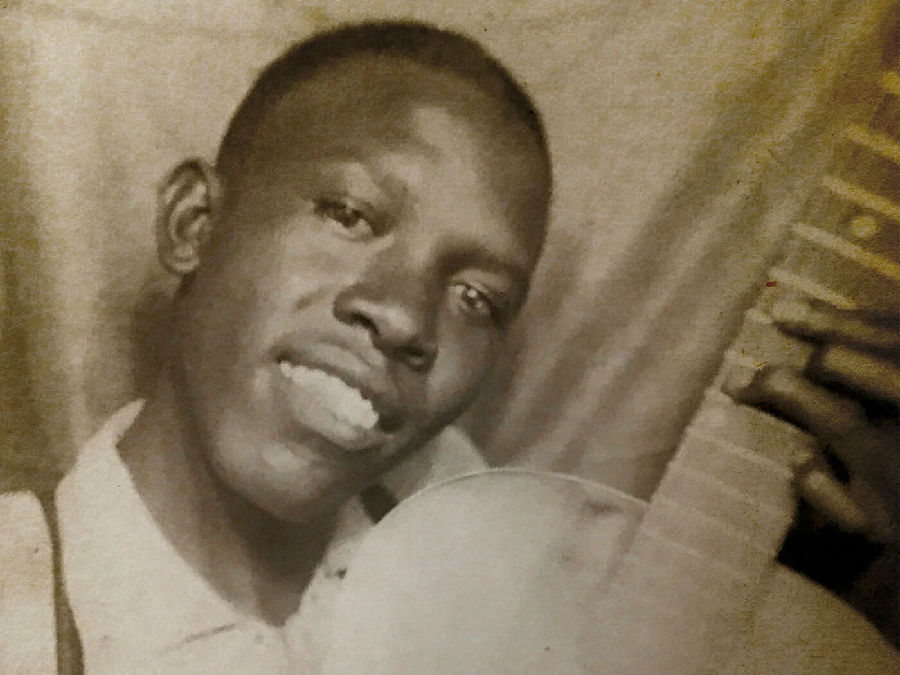There are many tales of people achieving all sorts of fortune and fame by selling their souls to the devil. Blues guitarist Robert Johnson is probably the most famous subject of that tall tale. The legend goes that he offered his soul at a Mississippi Delta crossroads, and in return he would receive musical success and talents beyond his wildest dreams. And, yes, to this day he is considered a pioneer of American blues guitar and songwriting. But the devil is in the details. And with a life so shrouded in mystery, it's hard to separate fact from his very appealing fiction.
有许多故事是这样写的,人们通过把灵魂出卖给魔鬼来获得财富和名望。蓝调吉他手罗伯特·约翰逊可能是这些荒诞故事中最著名的人物了。传说他在密西西比三角洲的十字路口献出了自己的灵魂,作为回报,他获得了音乐上的成功和超乎他最疯狂梦想的才华。是的,时至今日,他仍被认为是美国蓝调吉他和歌曲创作的先驱。但魔鬼藏在细节里。由于他的生活十分神秘,我们很难把事实和他非常吸引人的故事分开。
Humble Beginnings
卑微的出身
Robert Johnson was born in Hazlehurst, Mississippi on May 8, 1911, spending much of his beginnings on a plantation in the Delta. His mother, Julia Major Dodds, was a daughter of slaves. Dodds had ten children with her husband, but Robert was born out of an affair with a field hand named Noah Johnson. Later in Robert's childhood, Julia remarried and moved the family to Robinsonville, Mississippi.
罗伯特·约翰逊于1911年5月8日出生于密西西比州的哈兹赫斯特,在三角洲的一个大农场里度过了他的大部分童年时光。他的母亲朱莉娅·梅杰·多德是奴隶的女儿。多德和丈夫生了十个孩子,但罗伯特是她与一个叫诺亚·约翰逊的农场工人有染生下的。在罗伯特童年的后期,茱莉亚再婚,全家搬到密西西比州的罗宾逊维尔。
Robert seemed to take to music quickly as a child, demonstrating keen musical ability both on the jaw harp and harmonica. That interest didn't fade as he grew into his teens, as he was absent from school more and more, which his friends attributed to him studying music in Memphis. He would also play around with a makeshift instrument called a diddley bow, which was a wire attached to a house that a person could pull taut and hit with a stick, altering the pitch with a bottle that slides along the wire.
罗伯特小时候似乎很快就喜欢上了音乐,在竖琴和口琴上都表现出了敏锐的音乐能力。这种兴趣并没有随着他长到十几岁而消退,因为他越来越多地缺课,他的朋友认为这是他在孟菲斯学习音乐的原因。他还会玩一种叫做“迪德利弓”的临时乐器,这是一种连接在房子上的金属丝,人们可以拉紧并用棍子敲击,用一个沿着金属丝滑动的瓶子来改变音高。
The early and teenage years of Robert Johnson are very much shrouded in mystery. Historians have had to lean on anecdotal tales from other musicians and friends of his from those days, which is a lot like playing a game of telephone. There just isn't much to go on, and his Johnson's nomadic nature made it even harder to get a sense of his beginnings.
罗伯特·约翰逊的早年和少年时代都笼罩在神秘之中。历史学家们不得不从其他音乐家和他的朋友那里了解到一些轶事,这很像玩电话游戏。没有什么进展,而且约翰逊的游牧本性使人们更难以了解他的开始。
He'd pester every local musician he could for a chance to share a stage of a jam session with them. Many times, between other musicians' sets, Robert would take over the stage and play some songs of his own. A bold move for sure. Legendary bluesman Son House knew Robert Johnson during these years, and wasn't exactly blown away by the young man's ability at the time: "Folks they come and say, 'Why don't you go out and make that boy put that thing down? He running us crazy,'" House said. "Finally he left. He run off from his mother and father, and went over in Arkansas some place or other."
他总是缠着每一个当地音乐家,想找个机会和他们一起登上即兴演奏的舞台。很多时候,在其他音乐家的布景之间,罗伯特会登上舞台,演奏自己的一些歌曲。这肯定是个大胆的举动。传奇蓝调音乐人桑·豪斯在这些年里认识了罗伯特·约翰逊,但他当时的能力并没有让他大吃一惊:“伙计们,他们过来说,‘你为什么不出去让那个男孩把那东西放下呢?“他把我们逼疯了,”豪斯说。“最后他离开了,他离家出走,到阿肯色州的某个地方去了。”

When he was 18, Robert married sixteen-year-old Virginia Travis, but tragedy struck soon after, as she died during childbirth. Rumors abounded that it was punishment for his burgeoning musician lifestyle, but he forged ahead, deciding to dedicate his life to becoming a bluesman. He did manage to marry again in 1931, at the age of 20, though she too died while giving birth. This set him on an even more solitary path. Johnson would stay with numerous women, whom he would return to from time to time, but he remained single, adopting different aliases. The women he frequented mostly didn't know about each other, and he preferred it that way.
18岁时,罗伯特和16岁的弗吉尼亚·特拉维斯结婚了,但不久之后悲剧发生了,她在分娩时去世了。有传言说,这是对他迅速发展的音乐家生活方式的惩罚,但他继续前进,决定用一生来成就蓝调音乐人的事业。1931年,他在20岁时再次结婚,妻子在分娩时也去世了。这使他走上了一条更加孤独的道路。约翰逊会和许多女人待在一起,他会时不时地回到她们身边,但他仍然保持单身,而且使用不同的化名。他经常拜访的女人大多互不了解,他非常喜欢这样。
He was a loner, committed to playing music and travelling the road, playing music at his frequent stops. At his shows he would play mostly crowd-pleasing songs of the time, including jazz and country standards. And even though he would form strong temporary relationships with the townsfolk and local musicians, his stays would be brief, and then he would move on as easily as the breeze.
他是个独来独往的人,喜欢演奏音乐,喜欢在路上旅行,经常在停下来的时候演奏音乐。在他的演出中,他会演奏当时最能取悦观众的歌曲,包括爵士乐和乡村音乐。尽管他会与当地居民和音乐家建立起牢固的临时关系,但他的逗留时间会很短,然后他会像微风一样轻松地继续前行。
Birth of the Legend
传说的诞生
Son House mentioned that Johnson went to Arkansas for a time, and was somehow very different when he returned to Mississippi. The prevailing thought was that Johnson at the time was a mediocre guitar player, but overnight seemed to have gained an almost supernatural ability at the instrument. That's where the myth came about that he sold his soul to the devil late one night at a Delta crossroads, in order to become a virtuosic guitarist and songwriter. Pop culture has had a long love affair with the idea of a man selling his existence to an evil entity for musical riches.
桑·豪斯提到约翰逊去了阿肯色州一段时间,当他回到密西西比州时,不知怎么的,他变得很不一样。当时流行的看法是约翰逊是一个平庸的吉他手,但一夜之间似乎获得了一种几乎超自然的乐器演奏能力。有一天深夜,他在三角洲的一个十字路口把自己的灵魂卖给了魔鬼,以成为一名出色的吉他手和歌曲作者。流行文化非常喜欢这个观点:一个人为了音乐上的成功,将自己卖给了一个魔鬼。
The 1986 film Crossroads had leading man Ralph Macchio on a countrywide quest to learn about the legend of that devilish pact, and to find a lost song that Robert Johnson never got to show to the world. 2000's O Brother, Where Art Thou saw the trio of prison fugitives led by George Clooney coming across one Tommy Johnson, who, you guessed it, sold his soul to Satan to be able to play the guitar. It's a fantastical story, and that's why it's been told for so long, and in so many mediums. And of course it's fiction, but why let the truth get in the way of a good story? What's more likely is that Robert Johnson practiced tirelessly at home, and at any clubs that would give him an opportunity to play. And he even allegedly admitted to people that during his time away, he had been studying with some kind of guitar teacher.
1986年的电影《十字街头》中,男主角拉尔夫·马奇奥在全国范围内展开了一场探索,去了解那个恶魔契约的传说,去寻找一首罗伯特·约翰逊从未向世界展示过的遗失歌曲。2000年的《逃狱三王》中,乔治·克鲁尼带领的三个逃犯遇到了汤米·约翰逊,他为了能好好弹吉他,就把灵魂卖给了撒旦。这是一个幻想的故事,这就是它被讲了这么久,而且以这么多形式出现在观众视野的原因。当然这是虚构的,但为什么要让真相妨碍一个好故事呢?更可能的是,罗伯特·约翰逊在家里不知疲倦地训练,在任何能给他上场机会的俱乐部来锻炼自己。据称,他甚至向人们承认,在他离开期间,他一直在与某个吉他老师学习。
But it seemed like he had taken those lessons to some kind of new heights. His technique was something almost completely new, in which some of his guitar lines mimicked what the bass parts of a piano would play. In fact, many who studied his playing noticed that he did some kind of impressive combination of playing slide, rhythm, and bass all at the same time, while also singing. Playing non-stop is where those chops came from.
但他似乎把这些课程带到了一个新的高度。他的技巧几乎是全新的,他的一些吉他线条模仿了钢琴的低音部分。事实上,许多研究他演奏的人都注意到,他在演唱的同时,还同时演奏了一些令人印象深刻的滑音、节奏和低音。他的风格就来自这种不间断的演奏。












